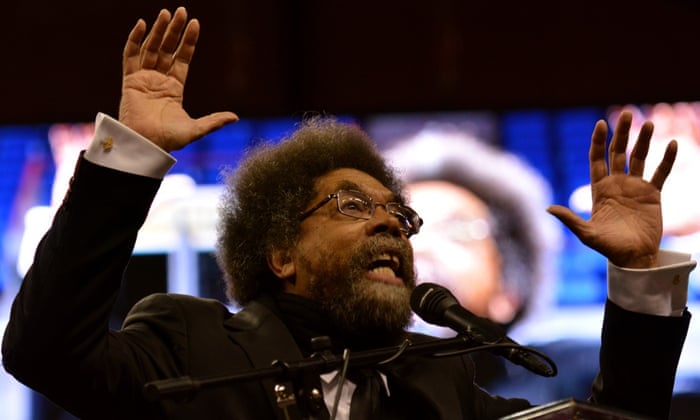The Cornel West-Michael Eric Dyson feud is petty. Black people are dying in the streets

Gary Younge
The circular confrontation is of such an insular nature there are no sides to take, just disappointment that the two academics are fighting one another

Cornel West can defend himself. But perhaps both her and Michael Eric Dyson should just stop talking about each other. Photograph: James Cooper/Demotix/Corbis
Contact author
@garyyounge
Monday 20 April 2015 15.57 EDTLast modified on Monday 20 April 2015 16.21 EDT
- Share on Facebook
- Share on Twitter
- Share via Email
- Share on LinkedIn
- Share on Google+
123
Comments
11
Shortly before the last presidential election, Columbia political science professor, Fred Harris, bemoaned in an essay: “Were Harold Cruse, the author of the unsparing 1967 book The Crisis of the Negro Intellectual, still alive, he would despair at the state of black intellectual life.”
Or as Princeton professor Eddie Glaude told him: “Too many black intellectuals have given up the hard work of thinking carefully in public about the crisis facing black America. We have either become cheerleaders for President Obama or self-serving pundits.”
As if on cue, Michael Eric Dyson, of Georgetown University, published a searing take-down of Cornel West, formerly of Harvard and Princeton and now at New York’s Theological Seminary, in The New Republic on Sunday bemoaning West’s “dramatic plummet from his perch as a world-class intellectual”.
The long-running feud between the two academics has sprawled across the academe and into the public sphere in much the same way as Hugh Grant and Colin Firth’s fight scene in Bridget Jones’ Diary flails through the streets of London – uncoordinated, undisciplined, inept, deeply personal and utterly inconsequential. One can only hope that this marks the end of this tiresome exchange; given the size of the egos involved one can only assume it won’t.
The source of this argument is the complicated relationship between the black American intelligentsia and the Obama administration. West, first skeptical, then supportive, and then harshly critical, has delivered a series of, at times, race-based ad-hominem attacks on Obama. He has branded the president a “Rockefeller Republican in blackface”; a “brown-faced Clinton”; and a “neoliberal opportunist.”
“I think my dear brother Barack Obama has a certain fear of free black men,” West once said. “It’s understandable. As a young brother who grows up in a white context, brilliant African father, he’s always had to fear being a white man with black skin.”
Dyson, on the other hand, has offered more critical support. “It’s worth noting that the president’s actions were in keeping with the demands of his profession,” he writes in The New Republic essay. “Like most recent Democratic politicians, Obama nodded in a progressive direction while campaigning but toed a more centrist line when it came time to govern.” Dyson, notably, offers no comment on whether he supports this shift, recognising it merely as a fait accompli.
Many of these concerns about the Obama presidency are worth taking up. The issue itself is crucial, intelligent discussion is long overdue and the consequent debate could be vital.
Obama’s ascent coincided with a widening in the racial discrepancy between black and white America in wealth, a deepening of school segregation and he has presided over a massive resurgence of black activism around police shootings. So the question of how the election of a black president has improved the lot of black Americans in this moment? What can he do? What should he do? What should be demanded of him? On what grounds should he be defended? These are critical matters for which the black intelligentsia should be uniquely suited and adequately prepared.
Sadly, this is not the debate that Dyson wanted to have with his essay. For, while this may have been the root of their conflict, their argument has not grown in stature but withered in acuity. Dyson’s lengthy essay is not about the record of the Obama administration, foreign policy, Black Lives Matter, the economic crisis, incarceration, the wealth gap, or any of the urgent political issues that relate to the black America. It is about West.
It questions his credentials as a self-proclaimed prophet (Dyson says he has none), his intellectual productivity (too low) and his desire to be in the limelight (too high). He berates West as a man who “inveighs, stampedes, and kvetches.” It’s a relentless, and at times, forensic demolition. But to what end? Is West the enemy? And if so of what?
My point here is not to take sides. West is more than capable of speaking for himself and has been happy to land his own blows. “I love Brother Mike Dyson,” West once said. “But we’re living in a society where everybody is up for sale. Everything is up for sale. And he and Brother [Al] Sharpton and Sister Melissa [Harris-Perry] and others, they have sold their souls for a mess of Obama pottage.”
The circular confrontation is of such an insular nature there are no sides to take. There are serious points that might be made about the plight of the celebrity academic – though those could relate to the author of The New Republic piece just as easily as the subject – but they are not pursued on their merits. There are also important arguments about the intellectual and his or her relationship to the polity. In the debris of Dyson’s demolition, one may find a broader critique that West’s “decline” is, in no small part, due to his refusal to embrace the symbolism of Obama’s presidency and tone down the critiques of its substance. But you’ll have to sift through the personal rancor to find them.
At the best of times this would be an internal dispute between two well-paid tenured professors that barely resonated beyond the academe and made precious little impact within it. But these are not the best of times. Black people are being shot dead in the street almost daily by trigger-happy cops and two ostensibly smart men, who have both produced excellent work and who pride themselves on being engaged academics responsive to the needs of the black community, are firing broadsides at each other.
The role of the public intellectual is to raise the level of public conversation so that it might better grapple with the complex issues of the day; Dyson’s essay further lowers it to the point of irrelevance. One can only hope they now bury it and direct their considerable polemical abilities at more worthy targets.







